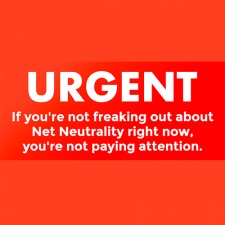The Federal Communications Commission has voted three-to-two to overturn the 2015 legislation that stopped ISPs from prioritising, blocking or throttling traffic.
"The Federal Communications Commission today voted to restore the longstanding, bipartisan light-touch regulatory framework that has fostered rapid Internet growth, openness, and freedom for nearly 20 years," the FCC said.
"Following detailed legal and economic analysis, as well as extensive examination of comments from consumers and stakeholders, the Commission reversed the FCC's 2015 heavy-handed utility-style regulation of broadband Internet access service, which imposed substantial costs on the entire Internet ecosystem... The framework adopted by the Commission today will protect consumers at far less cost to investment than the prior rigid and wide-ranging utility rules. And restoring a favourable climate for network investment is key to closing the digital divide, spurring competition and innovation that benefits consumers."
This is a hot topic for video games, especially in the increasingly digital marketplace we live in. Publishers and platform holders could be forced to pay more for their services in order to ensure they run at a fast enough speed.
The industry is not happy either - American games trade body the ESA told GamesIndustry.biz: "As an industry that has relied on internet protections to deliver exciting, innovative video games to fans around the world, ESA is disappointed that the FCC's order fails to prohibit blocking, throttling, and other anti-competitive conduct on the internet. Reasonable safeguards for broadband users and edge providers are needed to ensure that economic growth and technological advancement continue."
Meanwhile, indies talking to speaking to Polygon said that this move could devastate the market.
“An internet where massive corporations have even more control over what you can and cannot see, hear and say opens up a whole new world of problems for developers and indie games in general, Night in the Woods maker Scott Benson said.
But it might not be all bad news, with New York attorney general A.G. Schneiderman saying that he plans to fight the rollback.
"Today's new rule would enable ISPs to charge consumers more to access sites like Facebook and Twitter and give them the leverage to degrade high-quality of video streaming until and unless somebody pays them more money," Schneiderman. "Even worse, today's vote would enable ISPs to favour certain viewpoints over others."













